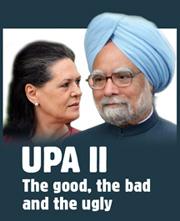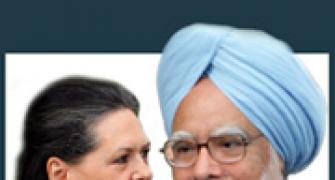 Flawed, our democracy may be, survive it will, says K Natwar Singh
Flawed, our democracy may be, survive it will, says K Natwar Singh
Manmohan Singh is now our third-longest serving prime minister. Jawaharlal Nehru and Indira Gandhi were at the helm for 17 and 16 years respectively. By 2014, MMS will have completed 10 years in the top job. Who says horoscopes don't count?
UPA-2 completed one year on May 21. Four more years to go. The first year has been patchy. More minuses, less pluses. As a team it has run out of steam. Some of the brightest ministers have provided the most entertainment. Collective irresponsibility is on the rise. The UPA partners are having the cake and eating it too.
The prime minister handled his long over-due press conference with confidence and competence. He said much but conveyed little. One or two planted questions gave him an opening to state that he had no differences with the Congress president. This needed to be said since all kinds of rumours were floating about this drift between number 10 and number seven. Neither side can benefit by a rift. Manmohan Singh is the best prime minister we have. One or two aspirants are waiting in the wings. They wait in vain. Since Saint Antony is not a threat he might just make it some day for a short while.
Indian democracy is now on auto-pilot. There is no danger of a democratic crash. Flawed, our democracy may be, survive it will. Its critics are mostly armchair-wallahs. Where one meets all the people one has been trying to avoid.
The media Mughals also enliven discussion in the Central Hall. They are much sought-after. No politician ever refuses to appear in print or on the TV screen. The media's influence has grown, is growing and there is no way it can be checked. Interviews become interrogations, which in turn degenerate into the inquisitorial. However, when all has been said, the bouquets and brickbats have been thrown, all the abuses hurled at the chattering box, it has to be conceded that television does more good than harm. I am not forgetting the real media menace -- trial by the media. Often the innocent get smeared. The conclusion is -- what cannot be cured must be endured. How very right the late Pope John Paul II was when he said, "If it does not happen on TV it does not happen."
Jawaharlal Nehru's 46th death anniversary fell on May 27. History has not been generous to him. Since his death only two worthwhile biographies have been written. S Gopal's three volumes provide a rounded, sensitive and constructively critical assessment of Nehru's heroic life, his achievements and failures. Substance and style make Gopal's biography immensely readable. The other is M J Akbar's Nehru, published in 1989, to coincide with Nehru's hundredth birth anniversary. B R Nanda, Judith Brown and most recently Shashi Tharoor too have produced books on Nehru. Not a large enough corpus for a man of Nehru's stature.
Was Nehru a great man? Yes. Was he a great prime minister? Yes. Was he a great foreign minister? He would have been but for his mishandling of Kashmir and India-China relations.
Nehru wrote history, made history but was not tied to history or shackled by it. He was endowed by a personality of majestic splendour. His political temperament lacked the robust realism of Sardar Patel. Yet, no one can deny that Nehru was the creator of modern, democratic and secular India. On the world stage he made an impact by forcefully emphasising that man's problems could not be solved by the shedding of blood.
Jawaharlal Nehru was one of the great sons of India. Leaving saints aside, Nehru is in the same league as Emperor Ashoka and Akbar. I can't help saying he would have rather relished being in this company.
Boris Pasternak was one of Russia's greatest poets of the twentieth century. In India he is known as the author of Dr Zhivago. Sadly, more people remember the film, starring Julie Christie and Omar Sharif, than the book.
The 50th anniversary of his death falls on 30 May. He was 70 years of age when died, in his dacha in Peredelkino, on the outskirts of Moscow. Boris Pasternak submitted Dr Zhivago to his Soviet publishers, who turned it down for 'political' reasons. A copy of the manuscript reached Italy and the Italian edition came out in late 1957. In 1958 Pasternak was awarded the Nobel Prize for literature. He was thrilled to accept it. His joy was short-lived. He and the prize were denounced by the literary hacks of the Soviet Union. Pasternak became a non-person. At one time, during his harassment he thought of seeking asylum in India.
I have visited Peredelkino three times, the last time in October 2005. In the drawing room, on the mantle piece stands an autographed photograph of Jawaharlal Nehru and a time piece, also a gift from Nehru. The Soviets let both reach Pasternak. Nehru had that kind of influence.








